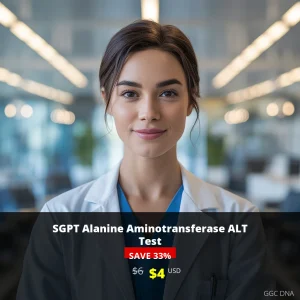Liver Panel 1 LFT Test – Comprehensive Liver Function Screening
Understanding Liver Health and Function Testing
The Liver Panel 1 LFT (Liver Function Test) is a comprehensive diagnostic screening that provides crucial insights into your liver’s health and functional capacity. As one of the body’s most vital organs, the liver performs over 500 essential functions including detoxification, protein synthesis, and production of biochemicals necessary for digestion. Regular liver function testing is fundamental for maintaining overall health and detecting potential liver disorders before they progress to serious conditions.
What Does the Liver Panel 1 LFT Test Measure?
Our advanced Liver Panel 1 LFT Test evaluates multiple key biomarkers through sophisticated spectrophotometry analysis:
Liver Enzyme Markers
- AST (SGOT) – Aspartate aminotransferase indicates liver cell damage
- ALT (SGPT) – Alanine aminotransferase, specific to liver inflammation
- AST:ALT Ratio – Helps differentiate between various liver conditions
- GGTP – Gamma-glutamyl transferase, sensitive marker for bile duct issues
- Alkaline Phosphatase – Indicates bile duct obstruction or bone disorders
Liver Function and Protein Markers
- Bilirubin, Total, Direct & Indirect – Measures bile pigment levels and jaundice risk
- Protein, Total – Assesses overall protein production capacity
- Albumin – Main protein produced by the liver, indicates synthetic function
- A:G Ratio – Albumin to globulin ratio for comprehensive protein assessment
Who Should Consider Liver Panel 1 LFT Testing?
This comprehensive liver screening is recommended for individuals experiencing:
Symptoms Indicating Liver Issues
- Persistent fatigue and weakness
- Abdominal pain or discomfort in the upper right quadrant
- Yellowing of skin or eyes (jaundice)
- Dark urine or pale-colored stools
- Nausea, vomiting, or loss of appetite
- Unexplained weight loss
- Swelling in legs and abdomen
Risk Factors and Preventive Screening
- Regular alcohol consumption
- Obesity or metabolic syndrome
- Family history of liver disease
- Diabetes or insulin resistance
- Exposure to hepatitis viruses
- Medications known to affect liver function
- Routine health check-ups for adults over 40
Benefits of Comprehensive Liver Function Testing
Early Detection and Prevention
The Liver Panel 1 LFT Test enables early identification of liver abnormalities before symptoms become severe. Early detection of conditions like fatty liver disease, hepatitis, or cirrhosis allows for timely intervention and lifestyle modifications that can prevent disease progression.
Comprehensive Health Assessment
This panel provides a complete picture of liver health by evaluating multiple functional aspects simultaneously. The combination of enzyme markers, protein levels, and bilirubin measurements offers gastroenterologists and physicians comprehensive data for accurate diagnosis and treatment planning.
Monitoring Treatment Effectiveness
For individuals undergoing treatment for liver conditions, regular LFT testing helps monitor treatment response and adjust therapeutic approaches as needed, ensuring optimal patient outcomes.
Understanding Your Liver Panel Results
Normal Range Interpretation
Normal results indicate that your liver is functioning properly without significant inflammation or damage. However, even within normal ranges, trends and patterns can provide valuable insights into your liver health status.
Elevated Liver Enzymes
Increased AST and ALT levels typically suggest liver cell damage or inflammation, which could indicate conditions such as hepatitis, alcohol-related liver disease, or medication-induced liver injury.
Bilirubin Abnormalities
Elevated bilirubin levels may indicate impaired bile flow, liver cell damage, or increased red blood cell breakdown, potentially signaling conditions like gallstones, cirrhosis, or hemolytic anemia.
Protein Level Variations
Changes in albumin and total protein levels can reflect the liver’s synthetic capacity, with decreased levels potentially indicating chronic liver disease or malnutrition.
Test Pricing and Availability
| Test Component | Price Type | Amount (USD) |
|---|---|---|
| Liver Panel 1 LFT Test | Discount Price | $24 |
| Liver Panel 1 LFT Test | Regular Price | $26 |
Test Specifications
- Turnaround Time: Daily results
- Sample Type: 2 mL (1.5 mL min.) serum from 1 SST
- Shipping Requirements: Refrigerated or frozen
- Preparation: No special preparation required
- Methodology: Advanced Spectrophotometry
Nationwide Accessibility
GGC DNA provides comprehensive liver function testing services across the United States with convenient locations in all major metropolitan areas including New York, Los Angeles, Chicago, Houston, Phoenix, Philadelphia, San Antonio, San Diego, Dallas, and San Jose. Our state-of-the-art laboratories ensure consistent, reliable results regardless of your location.
Take Control of Your Liver Health Today
Don’t wait for symptoms to escalate. The Liver Panel 1 LFT Test offers an affordable, comprehensive approach to monitoring your liver health and detecting potential issues early. With our daily turnaround time and no special preparation required, getting tested has never been more convenient.
Ready to prioritize your liver health? Book your Liver Panel 1 LFT Test today by calling our dedicated healthcare team at +1(267) 388-9828 or schedule your appointment online. Take the first step toward comprehensive liver wellness with GGC DNA’s trusted diagnostic services.






